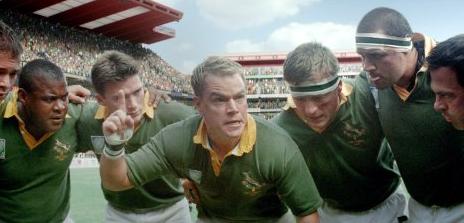It matters not how strait the gate,
How charged with punishments the scroll,
I am the master of my fate:
I am the captain of my soul.
Unlike seemingly every other movie critic, I’ve been having problems with late-period Clint Eastwood. I still greatly respect the man, both as one of the most iconic Hollywood stars of all time and as an undeniably talented filmmaker. “Unforgiven”, for one, is a masterpiece, and I also liked “Million Dollar Baby” quite a lot, to single out only his two Best Picture Oscar winners. On the other hand, I found “Mystic River” to be one of the most overrated flicks of this past decade and thought “Gran Torino” was pretty awful.
“Invictus” falls somewhere in between. It doesn’t achieve greatness, but it ain’t bad either. It’s a solid picture that tells a compelling true story, that of the 1995 Rugby World Cup. Now, like most North Americans, I don’t know or care much about the brutal sport of rugby, but the thing about that particular tournament was that it was held in South Africa and that, at the urging of President Nelson Mandela (Morgan Freeman), the country’s Black and White populations rallied around their national team, the Springboks, who went on become world champions against all odds.
This real-life scenario sounds perfect for a Hollywood sports drama, but what makes it particularly interesting are its political and human undercurrents. When, after being imprisoned for decades by the apartheid government, Mandela was finally freed then entered and won the race for the presidency of South Africa, he would have been well within his right to fire all the white folks on the presidential staff and to get rid of all the symbols of the old regime, such as the Springboks rugby team. But well aware of the latent racial tensions in the country, Mandela thought ahead and chose to embrace both his Black and White compatriots. Instead of repeating the mistakes of the past and letting old grudges dictate his actions, he wisely strived for unity and forgiveness instead. “The Rainbow Nation starts here. Reconciliation starts here”

Based on the John Carlin book “Playing the Enemy: Nelson Mandela and the Game That Changed a Nation”, “Invictus” further proves that sport can bring people together. In a somewhat superficial way, this made me think of how in spite of their differences, Francophones and Anglophones in Montreal are able to both cheer for the Canadiens hockey team. Through the characters of Mandela and Springboks captain François Pienaar (Matt Damon), the film also effectively shows what true leadership is made of, namely being an example of determination and integrity and, consequentially, inspiring others to “be better than they think they can be”.
Eastwood directs all this with skill if not overwhelming urgency, delivering a classy, sincere, meticulously crafted picture. Laudable achievements include the bright, sun-washed cinematography by Tom Stern and the score by Kyle Eastwood and Michael Stevens, which is nicely infused with African chants; the songs by some vocal band called Overtone are lame, though. As for the acting, it’s fine if not extraordinary. The thick South African accents aside, the performances by Morgan Freeman and Matt Damon are similar to many they’ve given in the past, and these roles are hardly the most complex and memorable they’ve played. In fact, as portrayed here, Mandela and Pienaar are kind of bland, one-dimensionally kind and noble figures.
So there you have it: “Invictus” is in no way one of the year’s best pictures and not nearly on the level of “Unforgiven” or even “Million Dollar Baby”, but it’s still a good little film, certainly a step up from the wrongheaded “Gran Torino”.

